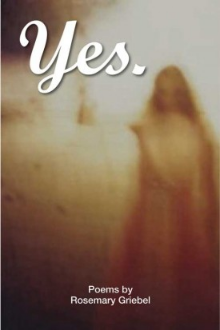 “Yes” has been shortlisted for the Stephan G. Stephansson Award for poetry, The Gerald Lampert Memorial Award and the Pat Lowther Memorial Award, congratulations Rosemary.
“Yes” has been shortlisted for the Stephan G. Stephansson Award for poetry, The Gerald Lampert Memorial Award and the Pat Lowther Memorial Award, congratulations Rosemary.
Beth Everest
A Review of
Yes.
by Rosemary Griebel
Frontenac House
ISBN 9781897181492
$16.00
I have been looking forward to reading this collection because of Rosemary Griebel’s recent successes, not least of which have been three winning contest pieces in FreeFall in two years. I anticipated being encouraged, if not motivated by a book titled Yes. I was not disappointed, but the book was hardly what I expected.
Yes opens with “My Father Comes Back,” and I was ready for the father to be a central focus. Not so. Instead, it’s the final line of this poem that sets up the ghosts that are to appear in the following pages: his large white eyes /turned on a darkening world, cavernous nostrils/releasing ghosts into winter air.” The world appears mostly dark, and the people in it struggle with its language in many forms. The ghosts appear as such characters as the father, mother, various others from dream and reality, and most curiously Helen Keller and Annie Sullivan.
In these Helen Keller poems, that seem to be echoes in most of the other pieces, there is a sad yearning. Take this stanza, for instance, in “Helen Keller to Anne Sullivan Macy”:
The reporters will ask about the wedding. Say I cried with joy,
my arms open to the day. If they ask about the future, tell them it
is like the lake that rocks the boat safe to a shadowless shore.(70)
These poems are very much about love, and language in its many forms. It is clear that Helen is in love with Annie, but Annie makes the safe choice; it is a shadowless one, as if the sun is too bright, too relentless for someone like Helen who is blind. Annie marries John Macy, and Helen is left to find her way alone. This is not to say that Helen cannot see, and we get the familiar theme of seeing without using one’s eyes:
….The water lapped beneath us: here gone, here gone
The sheer happiness of being together. You spelled the light into
my hand, and I held you with everything that has ever been true:
words, water, the night. This love.(70)
What’s different is the connection of language to the vision. The light is “spelled” in a myriad of ways, including the alphabetical spelling, the magic of touch, and the illumination. Moments like these draw me in to Griebel’s poetry. Here gone, here gone is a lovely echo of the yearning that follows like a ghost for the entirety of the book. It is the yearning of loss and the yearning of love. This is not to say that the yearning is all melancholic, because for Griebel, it isn’t. The happy/sad creates poetic tension. Take the centre section of “Words, Burning”:
I don’t want to remember farewells,
there’s too much cold in the world.
I want to sit and think about my grandmother
humming as she kneaded bread, her snowy arms
moving like dancers, or lovers in a warm bed….
….The way we lose loved ones, by something said—
or not said. The smell of rising bread and that light opening….(31)
The light opens. The light is energizing. The light illuminates, whether we see too much or too little. Or not at all. It is also connected to story and the emotion that story/memory brings. It is the “spool of narrative/ that reveals other ways/of seeing.”
The characters in this book connect to the land and the language through using all of the senses, and like Helen rely on heavily on the sense of touch, whether it is the “weight of the stone in my hand,” “the silence of swallowing,” or the placing of “my finger/upon the pale and leaven moon.” There is an abundance of mouth imagery, with the silence of things not said, or the “way your silence holds a story” or how it is “your mouth finding its way in the dark.” The ghost of Helen Keller moves throughout the book, pointing anew in other ways of seeing.
In a book called Yes I never get the sense I am listening to a motivational speaker. Rather, whether I am following Helen, the father, the grandmother, or any one of the montage of ghosts that appear and reappear, Rosemary Griebel’s voice urges me gently: she says, “Look at this world. Just look at it.” And so I do. But I use more than my eyes. And I am uplifted, and open to the light that no longer feels so shadowless. She ends her book with these lines:
There I quaffed the sharp chiseled air, the slow, sad light
of merciless winter and said, yes, this world is for my mouth forever…
And I am in love with it.
Yes. (82)
This Review first appeared in FreeFall Volume XXI Number 2 Fall 2011

